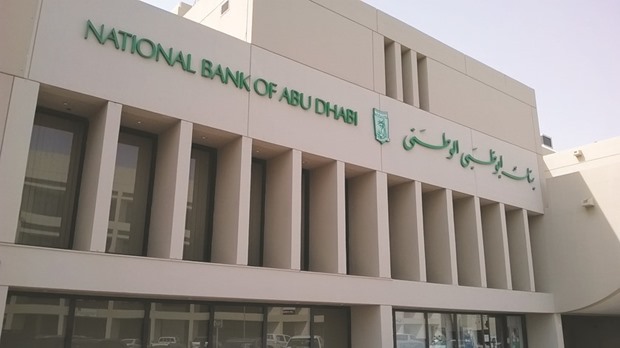Stock markets in the Middle East were mixed yesterday as Abu Dhabi’s bank-led rally ended and Egypt continued its descent, dragged down by tightening monetary policy.
On Sunday, Abu Dhabi’s index had surged 4.7% as merger talks between National Bank of Abu Dhabi and First Gulf Bank ignited speculation about consolidation in the sector, boosting bank shares.
But yesterday the speculation cooled and the index pulled back 1.0%. Shares in FGB retreated 3.4%, after an 11.5% gain on Sunday. Abu Dhabi Islamic Bank dropped 4.4% after rising 4.6% on the previous day. But NBAD’s shares continued to climb and added 4.4%, taking their gains over two days to 20%.
Many investors have been assuming that any share swap in a merger would favour NBAD holders. Arqaam Capital suggested a ratio of 1.15 NBAD for 1 FGB share, though SICO Bahrain estimated 1.4-1.5 shares of NBAD to 1 share of FGB.
“We believe that merger through share-swap agreement between NBAD and FGB is the most realistic option.
Without the due-diligence report and other details currently, we have limited information to be conclusive,” said SICO.
Meanwhile Dubai’s index climbed 0.3% in low volumes with builder Arabtec, the most traded stock, adding 1.5%.
Saudi Arabia’s index also gained 0.3 % in modest trading volume. Builder Abdullah Al Khodari advanced 1.2% on hopes the construction sector is due for a surge in demand because of the 2.5% tax on undeveloped urban commercial and residential land approved by the cabinet late last week.
The tax may push more land out into the market where it can be developed. But companies with large land banks could lose; NCB Capital said in a note that the tax would have a negative impact on Dar Al Arkan, as annual fees on its current land bank would be between 137mn and 160mn riyals ($36.5mn and $42.7mn).The stock fell 0.8%.
Egypt’s main index came off early lows but closed down 1.8% at 7,204 points, breaking technical support on the April and May lows of 7,276-7,327 points. That triggered a complex head & shoulders pattern formed by the highs and lows since March and pointing down to around 6,700 points.
Telecom Egypt (TE) dropped 2.1% after the industry’s regulator said it was selling 4G licences under a long-awaited plan to reform the sector while letting mobile operators, such as Vodafone Egypt, offer fixed-line services, ending TE’s domination of the sector.
A note by Cairo-based Naeem Brokerage said the competition in fixed-line licences could be a cause of concern for Telecom Egypt in the long run as the wholesale business could take a hit. But Naeem continues to rate the stock a “buy”. Vodafone Egypt, which could now face more competition in mobile, slumped 7.5 %.
The entire stock market has been depressed by Thursday’s interest rate hike, which surprised most investors, and the benchmark is down 7% since June 8.
More rate hikes look possible as the central bank battles inflation. Hani Janeenah, head of research at Cairo-based Beltone Finance, said the Egyptian economy was grappling with a contractionary monetary policy that was confirmed by Thursday’s “aggressive” rate hike of 1 percentage point.
Elsewhere in the Gulf, Kuwait’s index edged down 0.5% to 5,432 points; Oman’s index lost 0.4% to 5,784 points, while Bahrain’s index gained 0.2% to 1,115 points.
Merger talks add $2bn to NBAD shares
Bloomberg/Dubai

NBAD gained 4.4% yesterday to take the increase in its market value this week to 8.33bn dirhams ($2.3bn).
Abu Dhabi’s biggest bank by assets gained more than $2bn of market value in two days this week, spurred by merger plans that may create one of the Middle East’s largest lenders.
National Bank of Abu Dhabi rallied 20% in the period, the most since 2014, after the lender and First Gulf Bank said in a joint statement they’ve formed working groups to explore a potential combination. While FGB and other Abu Dhabi-listed lenders trimmed this week’s gains yesterday, the ADX Banks Index remains 6.7% above its Thursday close.
Banks listed in the emirate added more than $4bn to their market value on Sunday amid speculation NBAD and FGB’s move may be the start of a new phase of consolidation in the UAE’s banking industry. While a combination of NBAD and FGB would create an institution with about $170bn in assets, it still leaves about 50 banks in the UAE facing falling profits because of declines in government spending, slower economic growth and a drop in asset quality.
NBAD gained 4.4% yesterday to take the increase in its market value this week to 8.33bn dirhams ($2.3bn). FGB’s 3.4% drop cut its increase to 4bn dirhams. Financial institutions including Abu Dhabi Commercial Bank, Union National Bank, National Bank of Umm Al-Qaiwain and Bank of Sharjah are also still higher in the first two trading days of the week.
The UAE needs more consolidation in its banking industry, analysts from EFG-Hermes Holding SAE and Emirates NBD said yesterday.
